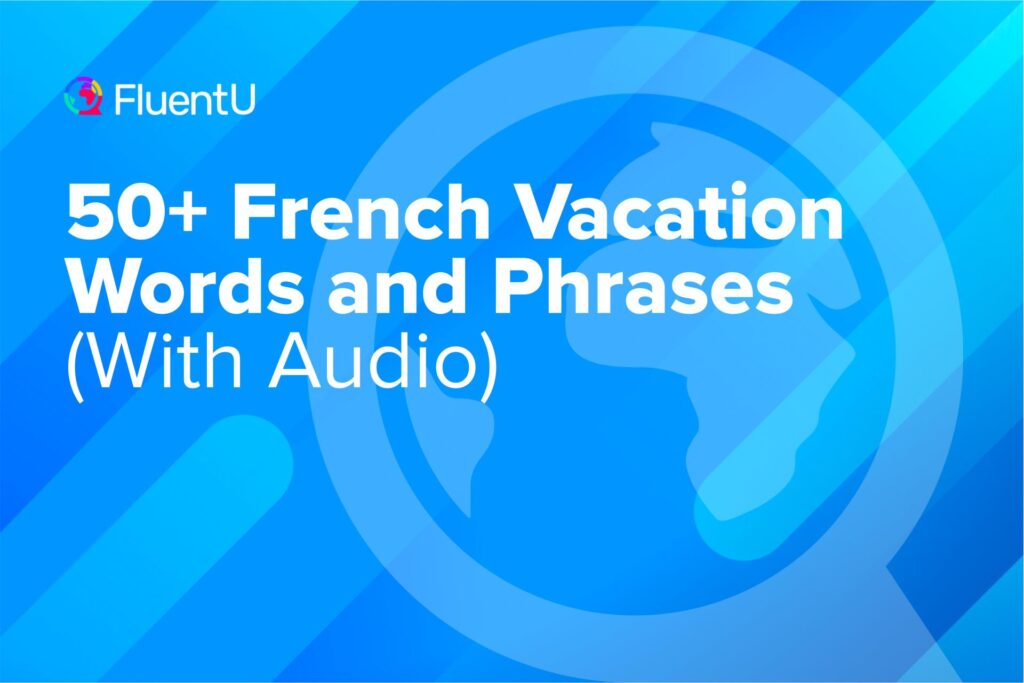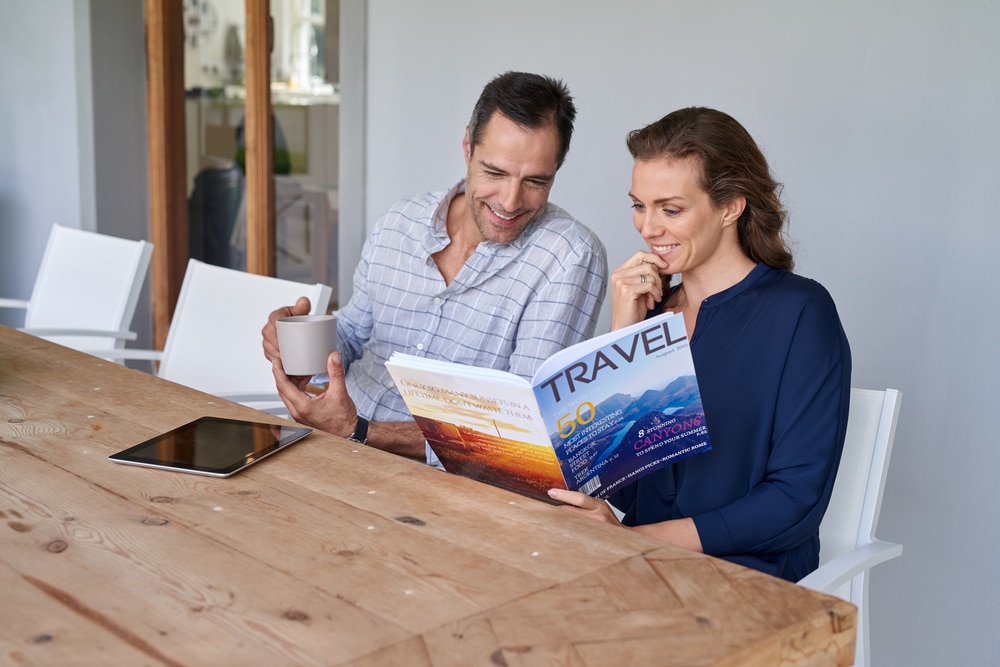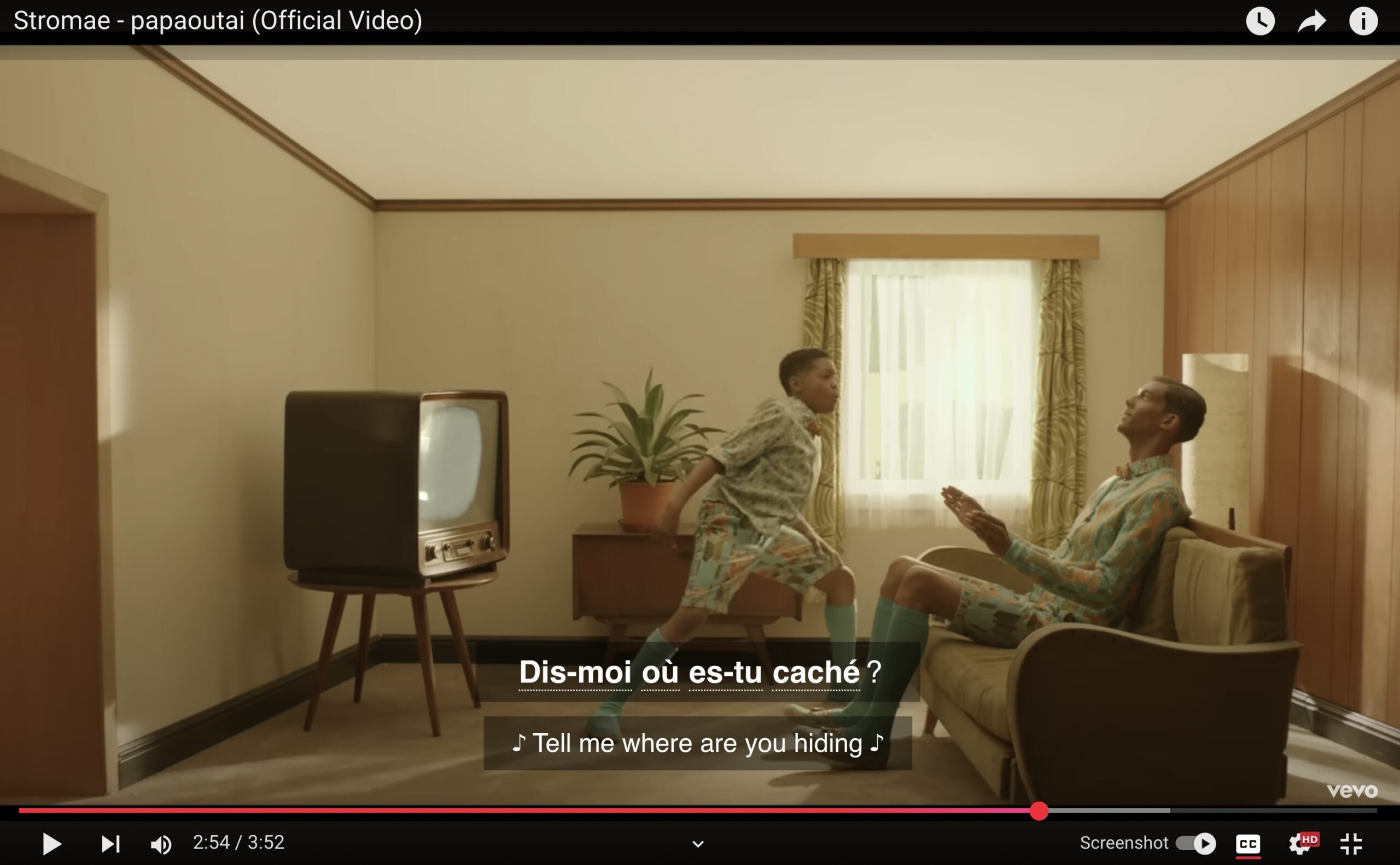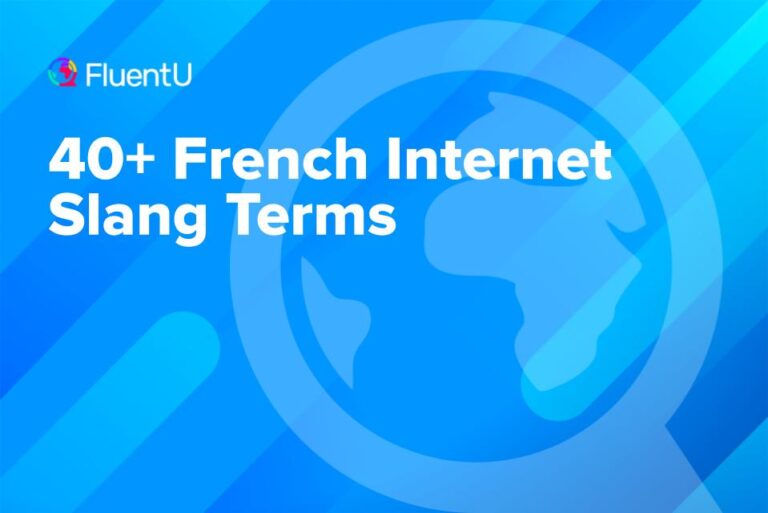50+ French Vacation Words and Phrases (With Audio)

Whether you enjoy the feel of seawater and hot sand or the crisp mountain air, there’s nothing like a relaxing vacation. However you choose to vacation, wouldn’t you love to do it all in French?
Here are 50+ useful French vacation vocabulary words and phrases, with example sentences so you can use them correctly in context.
Download: This blog post is available as a convenient and portable PDF that you can take anywhere. Click here to get a copy. (Download)
French Vacation Vocabulary for a Smooth Trip
Talking About Vacation Plans
This topic will require you to get comfortable with some basic interrogatives in French.
Common questions and answers
- où ? (where?)
- quand ? (when?)
- avec qui ? (with whom?)
- Comment voyages-tu ? (How are you traveling?)
- Je vais au / à la… (I’m going to…)
- pendant (during)
Vacation seasons
- les vacances de Noël (Christmas vacation)
- les vacances d’été (summer vacation, also known as les grandes vacances)
- les vacances d’hiver (winter vacation)
- les vacances de printemps (spring vacation)
- les vacances de la Toussaint (fall vacation; All Saints)
Example sentences
Où vas-tu en vacances ? (Where are you going on vacation?)
Je vais à la plage / à la montagne / à l’étranger. (I’m going to the beach/to the mountains/overseas.)
Quand iras-tu en vacances ? (When will you go on vacation?)
Je voyagerai pendant les vacances d’été. (I will travel during the summer vacation.)
Avec qui allez-vous voyager / vas-tu voyager ? (Who are you going to travel with?)
Vacation Accommodation
Places people stay on vacation
- un hôtel (a hotel)
- une auberge de jeunesse (a youth hostel)
- un club de vacances (a resort)
- un camping (a camping ground)
- un appartement (an apartment)
- un gîte (a holiday home/cottage)
- une chambre d’hôtes (a bed and breakfast)
Phrases for making a reservation
- Je voudrais une chambre (I would like a room…)
- salle de bains (bathroom)
- pour une / deux / trois / quatre personnes (for one/two/three/four people)
- du… au… (from [date] to [date])
Example sentences
Je voudrais une chambre pour deux personnes avec salle de bains du 5 août au 12 août. (I would like a room for two with a bathroom from August 5 to August 12.)
Pour mes vacances, je vais loger dans un hôtel. (For my vacation I am going to stay in a hotel.)
Je logerai dans une auberge de jeunesse. (I will stay in a youth hostel.)
L’année dernière, j’ai logé dans un camping. (Last year, I stayed in a camping ground.)
Modes of Transport
Getting to your destination
- en avion (by plane)
- l’aéroport (airport)
- en bateau (by boat)
- en train (by train)
- la gare (the station)
- le billet (the ticket)
- aller-retour (round trip)
Getting around your vacation spot
Example sentences
Comment vas-tu en Belgique ? En avion ou en train ? (How are you going to Belgium? By plane or by train?)
Où est l’aéroport, s’il vous plaît ? (Where is the airport, please?)
Je cherche la gare. (I am looking for the train station.)
À quelle heure est le départ de l’avion ? (What time does the plane leave?)
Combien coûte le billet pour Nice ? (How much does the ticket to Nice cost?)
Je voudrais un aller-retour pour le train qui va à Marseille. (I would like a return ticket on the train going to Marseille.)
Vacation Activities
This topic is a great opportunity to pick up common French nouns and verbs. There are hundreds of activities that you can add to your vocabulary list. Some common ones include:
- faire de la planche à voile (to windsurf)
- faire du lèche-vitrine (to go window-shopping)
- bronzer (to suntan)
- aller au restaurant (to go to the restaurant)
- nager (to swim)
- faire du ski (to ski)
- faire une randonnée (to go hiking)
- faire du vélo (to cycle)
- visiter des monuments / des musées (to visit monuments/museums)
- participer à une visite guidée (to join a guided tour)
Example sentences
Try to use this vocabulary with different tenses!
Aujourd’hui, je voudrais aller à la plage pour bronzer. (Today, I would like to go to the beach to suntan.)
Hier, je suis allé(e) faire du vélo en montagne. (Yesterday, I went cycling in the mountains.)
Demain, j’irai au restaurant avec mes amis. (Tomorrow, I will go to the restaurant with my friends.)
You can also listen out for these activities in this video lesson from our YouTube channel:
Dining Out
One of the best parts of going on a holiday in France is getting to eat out and sample food. So, food vocabulary should be in the cards. We’ll give you the basics for a vacation—for an in-depth guide to restaurant vocabulary in French, check out this article.
- le repas (the meal)
- le petit déjeuner (breakfast)
- le déjeuner (lunch)
- le dîner (dinner)
- la salle à manger (the dining room)
- le restaurant (restaurant)
- Qu’est-ce que vous recommandez aujourd’hui ? (What do you recommend today?)
- le plat du jour (today’s special)
- Je voudrais… (I would like…)
- L’addition, s’il vous plaît. (The check, please.)
Example sentences
À quelle heure est le petit déjeuner ? (What time is breakfast?)
Comme dessert, je voudrais la crème caramel. (For dessert, I would like the crème caramel.)
Recommandez-vous le plat du jour ? (Do you recommend today’s special?)
Je voudrais des escargots. (I would like some snails.)
Tips to Learn Vacation Vocabulary
Drill flashcards before your trip
Make flashcards for the words above and go through them periodically before your trip. You don’t even need to carry around a stack of index cards—there are apps like Quizlet for creating flashcards online and even playing games to test yourself.
Visualize the vocabulary
French vacation words tend to be highly visual, so consider making mind maps, or visual diagrams that represent the words you want to learn. There are many examples of mind map templates online.
You can also create a memory palace. The idea of this memorization device is to visualize a location—say, your childhood home—and populate it with the relevant vocabulary. For example, you could visualize a building and each hallway, room or object would be associated with a word you wish to remember.
It’s a great technique for visual learners to create context for seemingly isolated terms.
Watch authentic French videos
The best way to remember any new French vocabulary is to learn it in context. And one of the best ways to do that is to watch videos in French from French sources. You can easily find French TV shows and movies on streaming services like Netflix. If you prefer shorter videos, you can find French videos about all sorts of topics on YouTube.
FluentU is another way to hear French how it’s spoken in actual French-speaking regions. And now you can actually use FluentU to turn any Netflix or YouTube into a language learning lesson.
FluentU takes authentic videos—like music videos, movie trailers, news and inspiring talks—and turns them into personalized language learning lessons.
You can try FluentU for free for 2 weeks. Check out the website or download the iOS app or Android app.
P.S. Click here to take advantage of our current sale! (Expires at the end of this month.)
Start using the words in your own sentences
You’ll be using the words and phrases below with real French speakers throughout your vacation. So, why not start practicing now?
For example, don’t just learn the word nager (to swim). Start creating sentences, like:
Où est la plage ? J’aimerais nager cet après-midi. (Where is the beach? I would like to swim this afternoon.)
Savez-vous nager ? (Do you know how to swim?)
To ensure your own sentences actually make sense, you can use a grammar checker like Bon Patron.
Now that you’ve used all the tools and resources at your fingertips and you’ve prepared everything for your vacation, you’re ready to go.
Use your new vocabulary as often as you can and you’ll become good at communicating and recognizing repeated words.
Bonnes vacances ! (Have a good vacation!)
Download: This blog post is available as a convenient and portable PDF that you can take anywhere. Click here to get a copy. (Download)
And One More Thing...
If you're like me and enjoy learning French through movies and other media, you should check out FluentU. With FluentU, you can turn any subtitled content on YouTube or Netflix into an engaging language lesson.
I also love that FluentU has a huge library of videos picked specifically for French learners. No more searching for good content—it's all in one place!

One of my favorite features is the interactive captions. You can tap on any word to see an image, definition, and examples, which makes it so much easier to understand and remember.
And if you're worried about forgetting new words, FluentU has you covered. You'll complete fun exercises to reinforce vocabulary and be reminded when it’s time to review, so you actually retain what you’ve learned.
You can use FluentU on your computer or tablet, or download the app from the App Store or Google Play. Click here to take advantage of our current sale! (Expires at the end of this month.)
















